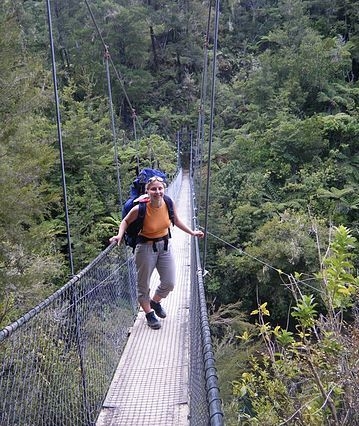based on the interview
given by Olga Tonkova
Population. The country is inhabited amazingly irregularly. There are around 4 million people in New Zealand. Just imagine, one third of them live in Auckland which is the yachting capital of the world, but not the capital city of the country. Wellington, the capital, houses half a million. Both cities are located in the North Island. The South Island is inhabited by another million citizens. If you are following my calcutations, you've already noticed that the left one million residents are scattered around the North Island. The number of tourists visiting the country every year by far outnumbers the locals. A lot of young people from Europe and both Americans come to the country under the 'Work'n'Holiday’ programme. They come for 6 months work and 6 months travel. To this end they usually buy a second hand little caravan and go all over the country taking on seasonal jobs time and again. At the end of the year the house on wheels is sold cheaply and cheerfully.
Environment. New Zealand is nuclear free territory. The authorities watch this regulation very carefully. Sounds good however, sometimes it goes beyond common sense. In the 1970s a famous French yachtsman Eric Tabarly, who was taking part in a round the world race, was not allowed to cross the maritime belt because the keel of his boat was made of contained depleted uranium.
It's a very ecologically clean country. And yet there's one thing you should be aware of, the ozon layer. It is so thin that provokes increase in cancer diseases, arises eye and skin problems. One gets burnt in the blink of an eye. After living there for a year my sister can't stay outside without sunglasses for long.
Foodstuffs are of very high quality. I think that milk and mutton are the best in the world. There’s always a large variety of amazingly cheap fresh seafood. By the way, Russian fishing boats have contracts to work in the maritime belt of New Zealand. Wine is superb there too. Some wines rate with the very best and can compete with French ones.
Along with that, they are not very good at cooking. The best example of traditional cuisine is English Fish’n’Chips. At the same time you can’t but mention their openness to all sorts of experiment in this area. There are a lot of restaurants of various world cuisines: Thai, Japanese, Chinese, Vietnamese, Cambodian, Italian and French. Wellington holds the top position in the world by the number of restaurants per capita.
No wonder obesity and alcohol addiction are in the list of national problems.
Miscellaneous.
Almost every kiwi (that is how locals call themselves) has lived and worked abroad. The so called ‘overseas experience’ is an inherent part of growing-up. To gain such experience they mainly set off for Australia and UK.
New Zealand can boast one of the lowest crime rates in the world.
Kiwi like hiking. There’s a well-developed system of hiking paths and little logs around the place.
